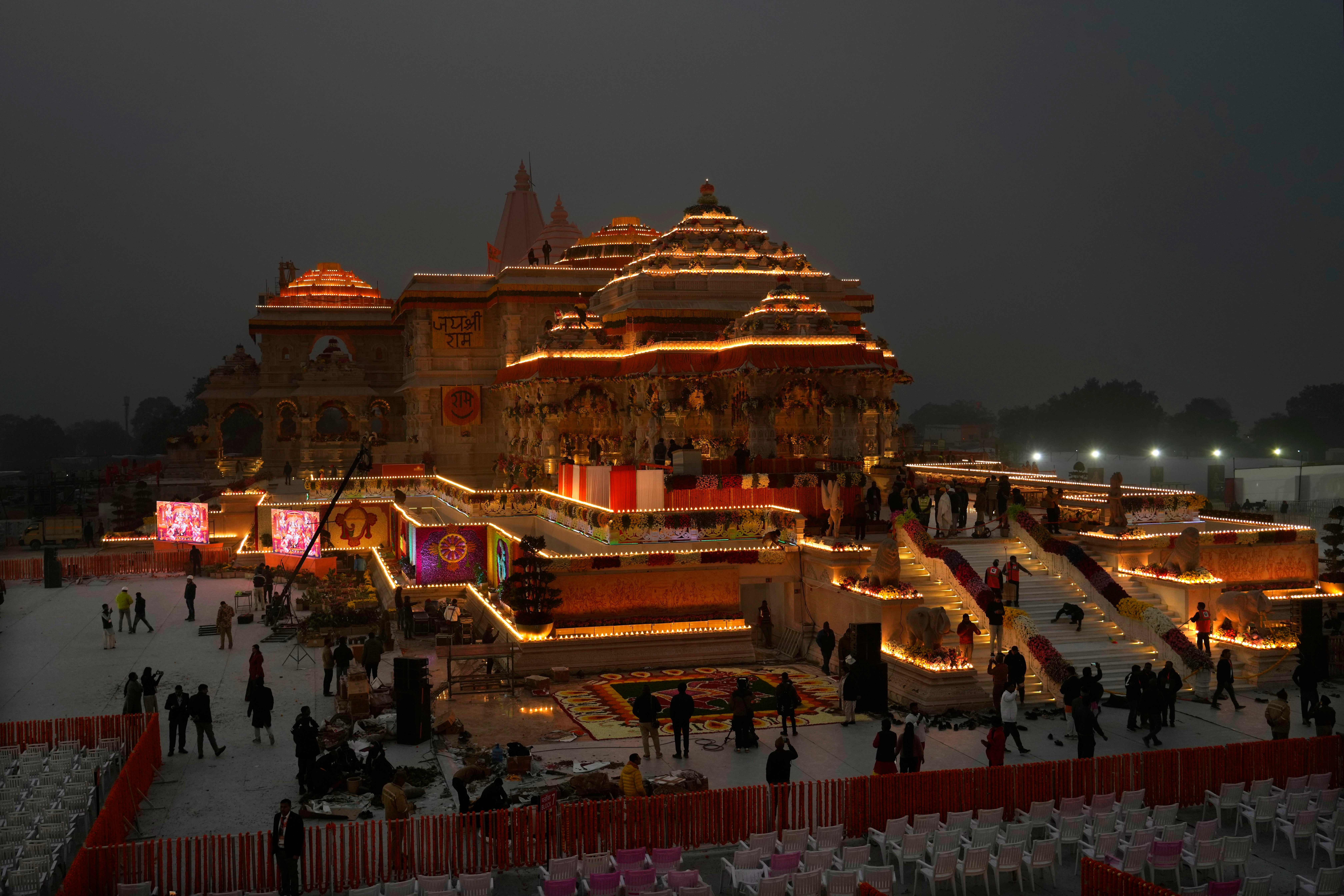India’s Modi is set to open a controversial temple in Ayodhya in a grand event months before polls
Indian Prime Minister Narendra Modi is set to open a controversial Hindu temple built on the ruins of an ancient mosque in the holy city of Ayodhya in a grand event that is expected to galvanize Hindu voters months before a general election

Indian Prime Minister Narendra Modi on Monday was set to open a contentious Hindu temple built on the ruins of an ancient mosque in the holy city of Ayodhya. The grand event, which will be attended by thousands, is expected to benefit the Indian leader in the polls just months before a general election.
The inauguration of the temple, which is still under construction, is dedicated to Hinduism’s most revered deity Lord Ram. It fulfills a demand made by millions of Hindus for over 100 years and delivers on a crucial campaign pledge from Modi and his Hindu nationalist Bharatiya Janata Party.
Ayodhya, once dotted with tightly packed houses and rundown stalls, has undergone an elaborate makeover in the lead up to the inauguration. Narrow roads have been turned into a four-lane pilgrimage route leading to the temple, tourists are arriving at a new airport and sprawling railway station, and major hotel chains are building new properties.
On Monday morning, the mood in the city was jubilant. Devotees from across the country have arrived to celebrate the opening, with groups of them dancing to religious songs that blare from speakers on roads bedecked with flowers. Huge cut-outs of Lord Ram and billboards of Modi are ubiquitous across Ayodhya, where the borders have been sealed to prevent more people from coming in. Some 20,000 security personnel and more than 10,000 CCTV cameras have been deployed.
Harish Joshi arrived in Ayodhya from Uttarakhand state four days before the ceremony, hopeful that he may be able to get a glimpse of the ceremony. “I am here to see history unfolding before our eyes. For centuries, the story of Lord Ram has resonated in the hearts of millions," he said.
The prime minister, alongside several Hindu priests, will attend the consecration ceremony later on Monday, for which a 1.3-meter (4.25-foot) stone sculpture of Lord Ram was installed in the temple’s inner sanctum. Overall, nearly 7,500 people, including the country’s most elite industrialists, politicians and movie stars, are also expected to attend.
Analysts and critics see Monday’s ceremony as the start of the election campaign for Modi, an avowed nationalist and one of India’s most consequential leaders who has sought to transform the country from a secular democracy into a distinctly Hindu state in his nearly 10 years in power.
The temple, located at one of India’s most vexed religious sites, is expected to embolden Modi’s chances of clinching a record third successive term by drawing on the religious sentiments of Hindus, who make up 80% of India’s population of 1.4 billion.
Built at an estimated cost of $217 million and spread over nearly 3 hectares (7.4 acres), the temple lies atop the debris of a 16th-century mosque. It was razed to the ground in 1992 by Hindu mobs who believed the Babri Mosque was built on temple ruins that marked the birthplace of Lord Ram.
The site has long been an intense religious flashpoint for the two communities, with the demolition of the mosque triggering bloody riots across India that killed 2,000 people, mostly Muslims.
The dispute ended in 2019 when, in a controversial decision, India’s Supreme Court called the mosque’s destruction “an egregious violation” of the law, but granted the site to Hindus while giving Muslims a different plot of land.
The fraught history is still an open wound for many Muslims, who see the construction of the temple as a testament to Modi’s Hindu-first politics.
Officials say the temple, a three-story structure etched out of pink sandstone, will open to the public after the ceremony and they expect 100,000 devotees to visit daily. Builders are still working to finish 46 elaborate doors and intricate wall carvings.
The inauguration has morphed into a massive national event.
Modi’s government has planned live screenings across the country and even movie theaters in some cities will broadcast the event while offering free popcorn. BJP workers have gone door to door handing out religious flags, while Modi has encouraged people to celebrate by lighting lamps at homes and in local shrines. His government announced a half-day closure on Monday for all its offices, and numerous states have declared it a public holiday. Even the stock and money markets are closed for the day.
But not all are rejoicing. Four key Hindu religious authorities have refused to attend, saying consecrating an unfinished temple goes against Hindu scriptures. Some top leaders from India’s main opposition Congress party are also boycotting the event, with many opposition lawmakers accusing Modi of exploiting the temple for political points.
Bookmark popover
Removed from bookmarks